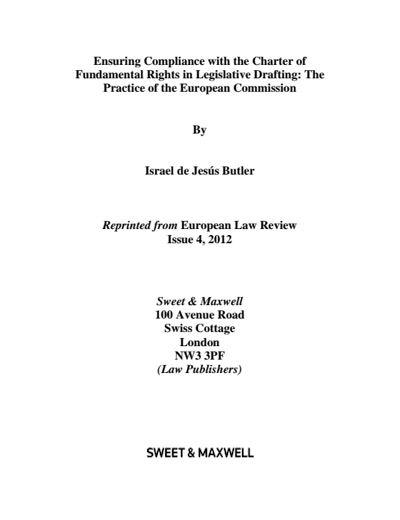The Justice Scoreboard: An Effective Mechanism to Enforce Respect for the Rule of Law?
By Israel Butler
In September, Vice-President Reding announced that the Commission would introduce a Justice Scoreboard, as an “effective mechanism … to enforce respect for the rule of law.” The Scoreboard will assess and compare the justice systems of the European Union (EU) 27 member states on the basis of strength, efficiency and reliability and will form part of the European Semester. But how effective can it really be?
Before aspiring states are allowed to join the EU, they must establish the rule of law, the democratic process, and protection for human rights (part of the “Copenhagen criteria“). According to the Treaty on European Union, these are among the values on which the EU is founded. But once admitted, members face no workable mechanism to enforce adherence to these values at EU level. And here lies the paradox: There is little that the EU can do to prevent an existing member country from reversing the very reforms that were a condition of joining.
The EU does have a mechanism for sanctioning a member state if it commits a “serious and persistent breach” of the EU’s values but it has never been used. National governments in the Council have to unanimously agree that there is in fact a “serious and persistent breach” before action can be taken. The Commission also has the power to take states to the EU’s Court of Justice where a country has failed to implement specific rules of EU law. But the Commission maintains that there is little EU legislation covering rule of law, democracy and human rights issues. According to Vice-President Reding, the Scoreboard is intended as a mechanism half-way between these two extremes that can be applied “more generally and more systematically.”
Why can’t the EU replicate its forceful EU action on Romania in other EU countries? Because the tough line on Romania was possible only because it (along with Bulgaria) was made subject to a cooperation and verification mechanism (CVM) as a condition of joining the EU. Under the CVM, the European Commission can require Romania to meet certain benchmarks including “a more transparent, and efficient judicial process.” However, the CVM does not apply to other members.
The European Semester, of which the Justice Scoreboard will form part, is an EU tool for coordinating and monitoring fiscal policy, economic growth and macroeconomic structural reforms at national level. A member cannot be sanctioned for failing to implement the EU’s recommendations for reforms under the Semester. Financial sanctions can kick in, however, in cases of excessive deficits and (for Euro members) macroeconomic imbalances. The system is not designed to address rule of law issues.
If the Scoreboard is to be an effective tool to promote the rule of law, the Commission will have to address two issues. First, the Scoreboard will need teeth. Governments with serious rule of law problems are unlikely to respond to quiet diplomacy or even naming and shaming, unless this is supported by the threat of sanction. There are already EU rules in place that require effective (and by implication, independent) judicial procedures to be available for individuals in national courts. Developed by the EU’s Court of Justice, these rules ensure that individuals can enforce the rights that EU law gives them. This would entitle the Commission to begin infringement proceedings against any country that does not have an independent judiciary—something that it has not yet done. By making clear that it is willing to use this power in the context of the Scoreboard, the Commission could incentivise compliance with recommendations that it might issue as part of the Semester.
Second, it should ensure that the European Semester monitors justice systems as a whole. Under current plans, the Scoreboard will only monitor civil and commercial courts. The rule of law is designed to prevent governments from abusing their power, and particularly from interfering with individual liberty. Administrative courts check that a government acts within the limits of the law, and criminal courts ensure that governments cannot use criminal sanctions unless legal guarantees are followed to ensure a fair trial. While civil and commercial courts mainly mediate conflicts between private individuals, it is the administrative and criminal courts that protect the individual from the state, which is the very essence of the rule of law.
Furthermore, if the Commission is serious about protecting the rule of law, it needs to do more to address clientelism and control over the media by governments and their political allies in the business world. The rule of law is designed to keep a government within the limits of the law. This is an empty safeguard where governments are able to manipulate or misinform public opinion to ensure support for whatever laws it wishes to pass. The rule of law relies on democracy, and genuine democracy relies on free speech and political representatives who are not tied to commercial interests.
The EU already has the power to hold governments to account where they effectively fund friendly media outlets through selective state advertising contracts because it has responsibility for ensuring rules on fair competition. Likewise, the EU can demand repayment of and freeze EU funds to governments that use this money to hand out lucrative public contracts to political allies without a fair procurement process.
If it is to have any effect, the Scoreboard needs to be pursued courageously: given teeth and broadened to include criminal and administrative courts. It should also be complemented by a clear commitment from the Commission to enforce EU competition law rigorously in the media market and monitor the use of EU funds closely. Speaking softly will not be enough to dissuade governments from undermining the rule of law unless they know that the Commission is carrying a big stick that it is not afraid to use.
Until January 2015, Israel Butler was a senior policy analyst at the Open Society European Policy Institute.


